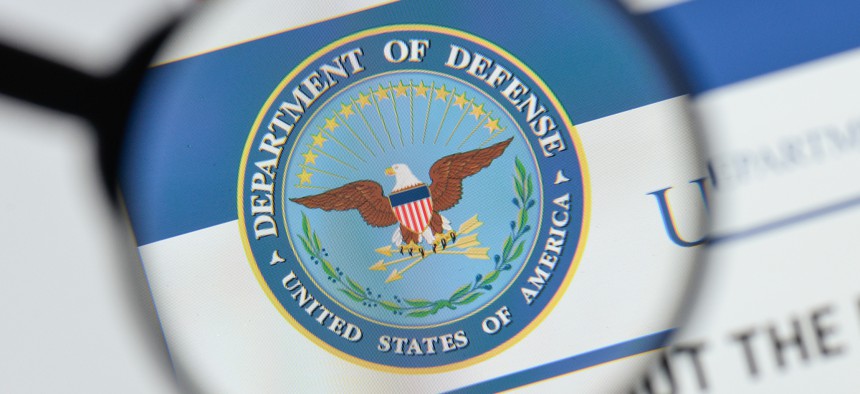Pentagon’s AI Center Awards $800M Contract Through GSA Center of Excellence Program

Casimiro PT/Shutterstock
The contract is set to provide artificial intelligence-powered analytics tools to “prepare for future warfare operations.”
Through its partnership with the General Services Administration’s Centers of Excellence, the Defense Department’s central artificial intelligence program signed an $800 million contract with Booz Allen Hamilton for AI-powered warfighter support tools.
The Joint Artificial Intelligence Center, or JAIC, issued a five-year task order—awarded through GSA’s Alliant 2 governmentwide acquisition contract—to “deliver artificial intelligence-enabled products to support warfighting operations and be instrumental in embedding AI decision-making and analysis at all tiers of DoD operations,” according to a release Monday.
Booz Allen Hamilton will focus on identifying and integrating advanced analytical tools with existing DOD datasets to create “a definitive information advantage to prepare for future warfare operations.” The work will include “data labeling, data management, data conditioning, AI product development, and the transition of AI products into new and existing fielded programs and systems across the DoD.”
“The Joint Warfighting mission initiative will provide the Joint Force with AI-enabled solutions vital to improving operational effectiveness in all domains,” JAIC Director Lt. Gen. Jack Shanahan said in the statement. “This contract will be an important element as the JAIC increasingly focuses on fielding AI-enabled capabilities that meet the needs of the warfighter and decision-makers at every level.”
The contract is the direct result of a partnership established in September between the JAIC and GSA’s then-newly created AI Center of Excellence. The broader Centers of Excellence program was established in 2017 to act as a modernization advisory service, helping federal agencies identify needs across specific areas like cloud services or customer experience and develop acquisition strategies.
“The CoE and the JAIC continue to learn from each other and identify lessons that can be shared broadly across the federal space,” said Anil Cheriyan, director of GSA’s Technology Transformation Service, which oversees the CoE program. “It is important to work closely with our customers to acquire the best in digital adoption to meet their needs.”
GSA’s Federal Systems Integration and Management, or FEDSIM, office also played a role in the contract award.
Col. Brad Boyd [no relation to the author], director of Joint Warfighting at the JAIC, described Booz Allen Hamilton’s role as the primary integrator managing dozens of contracts “in a way that supports the JAIC’s mission so that the JAIC isn’t managing 50 contracts” related to things like data labeling, etc.
Going with a prime integrator will free up the 172 people with the JAIC to focus more on the center’s primary lines of effort. “If we wanted to try and manage all the subcontracts… we would be consumed with contract management tasks. We don’t have the manpower,” he said.
The JAIC is pursuing three main lines of effort. The first is creating AI to deliver what Boyd calls “decision advantage,” as in faster and better decision making, as part of the Joint All Domain Command and Control, or JADC2 effort. “What we do is advocate,” he said. “In order to make a JADC2 system AI-capable, it has to have this… We are active almost like a consultant to say, ‘how does JADC2 be AI-ready?’”
The second primary line of effort, Boyd described as “overmatch” as in outpacing the adversary in observing, orienting, deciding and acting. One place where AI is shrinking that cycle is in computer vision. “The lines between warfighting functions are no longer as distinct as they were,” he said.
The third primary line of effort is in long-range fires.
In February, the Defense Department adopted the Defense Innovation Board’s list of AI principles to guide the development of AI programs. Boyd said that the principals will play a role in every contract. “We would consider ethics in every phase of development,” he said and offered that adherence to the principals was a requirement in every contract. “We’re going to look at something in the lens of how it meets the ethical principles.”
Patrick Tucker contributed to this post.
Editor's note: This story was updated with additional information.






